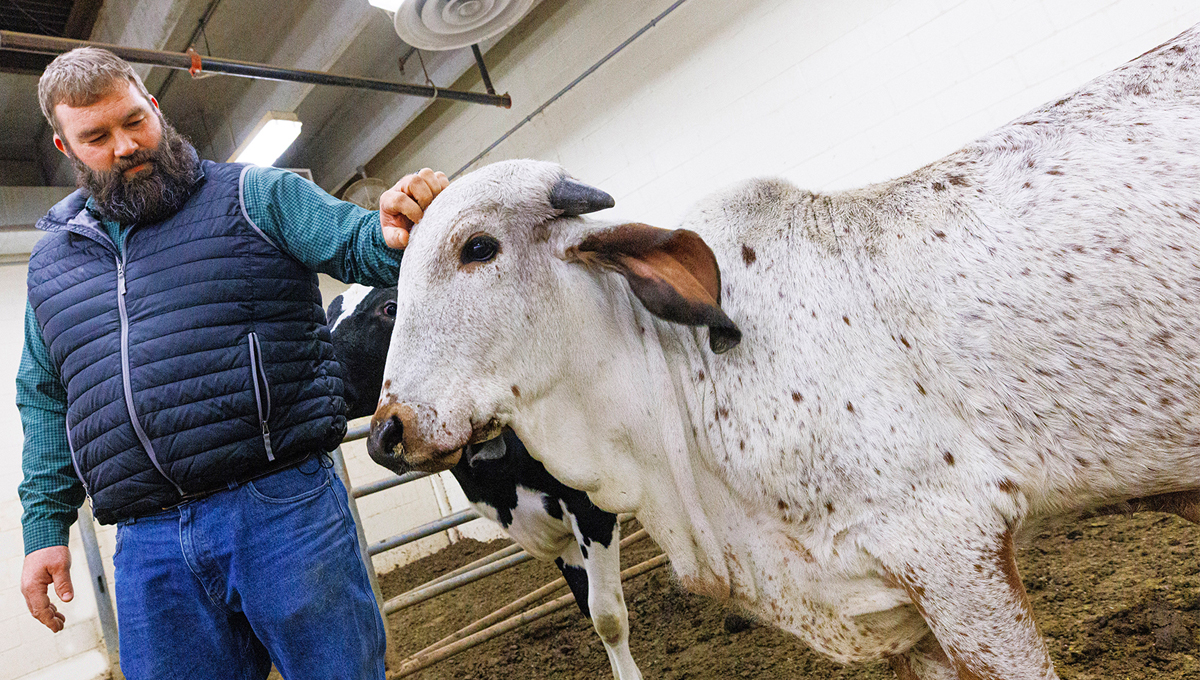
Scientists Develop First Gene-Edited Calf Resistant to Bovine Viral Diarrhea Virus
May 17, 2023| |
Scientists at the United States Department of Agriculture Agricultural Research Service (USDA ARS), the University of Nebraska–Lincoln (UNL), the University of Kentucky, and industry partners Acceligen and Recombinetics, Inc. have developed the first gene-edited calf with resistance to bovine viral diarrhea virus (BVDV), which costs the U.S. cattle sector billions of dollars annually.
BVDV, one of the most significant viruses affecting the health and well-being of cattle worldwide, can be disastrous to pregnant cows as the virus can infect developing calves, causing spontaneous abortions and low birth rates. It does not affect humans but is highly contagious among cattle and can cause severe respiratory and intestinal diseases. It was first identified in the 1940s and scientists have been studying it ever since. Despite more than 50 years of vaccine availability, controlling BVDV disease remains a problem since vaccines are not always effective in stopping transmission.
In the past 20 years, scientists discovered the main cellular receptor (CD46) and the area where the virus binds to that receptor, causing infection in cows. Scientists modified the virus binding site in this recent study to block infection. They used gene editing to slightly alter CD46 so it would not bind the virus yet retain all its normal bovine functions. Promising outcomes were seen in the laboratory, so Acceligen edited cattle skin cells to develop embryos carrying the altered gene. These embryos were transplanted into surrogate cows to test whether this approach might also reduce virus infection in live animals.
The approach worked, and the first CD46 gene-edited calf, named Ginger, was born healthy on July 19, 2021. For several months, Ginger was observed and then later challenged with the virus to determine if she could become infected. She was housed for a week with a BVDV-infected dairy calf that was born shedding the virus. Ginger's cells displayed significantly reduced susceptibility to BVDV, which resulted in no observable adverse health effects.
For more details, read the news articles on the USDA ARS Research News and Nebraska Today.
| |
You might also like:
- First Gene-edited Calf Developed to be Less Susceptible to BVDV
- No Difference Found in Meat, Milk From Gene Edited Cows vs Conventional Cows
- Hornless Cattle Now Possible Thanks to Genome-editing
Biotech Updates is a weekly newsletter of ISAAA, a not-for-profit organization. It is distributed for free to over 22,000 subscribers worldwide to inform them about the key developments in biosciences, especially in biotechnology. Your support will help us in our mission to feed the world with knowledge. You can help by donating as little as $10.
-
See more articles:
-
Plant
- Bayer Submits Application for Second Renewal for Import and Processing of GM Maize MON810 in The Netherlands
- CIMMYT's Alison Bentley Announced as 2023 Borlaug CAST Communication Awardee
- ISAAA Inc. to Hold ASCA6 on September 11-15 in Indonesia
- Queensland University of Technology Seeks Approval for Commercial Cultivation of GM Banana
- Genome of Australian Round Lime Reveals Key to Citrus Greening Resistance
-
Animal
- Scientists Develop First Gene-Edited Calf Resistant to Bovine Viral Diarrhea Virus
-
Food
- USDA Helps Bring CRISPR to UH Students to Support Future Food and Agri Workforce
-
Health
- Synthetic Genetic Manipulation Almost Doubles Lifespan of Cells
- CRISPR Used to Find Antidote for Deadly Mushroom Poison
- Scientists Found a Way to Level Up Nonviral Gene Editing
-
Read the latest: - Biotech Updates (February 18, 2026)
- Gene Editing Supplement (January 28, 2026)
- Gene Drive Supplement (February 22, 2023)
-
Subscribe to BU: - Share
- Tweet

